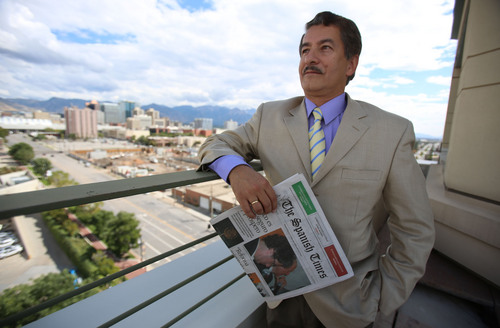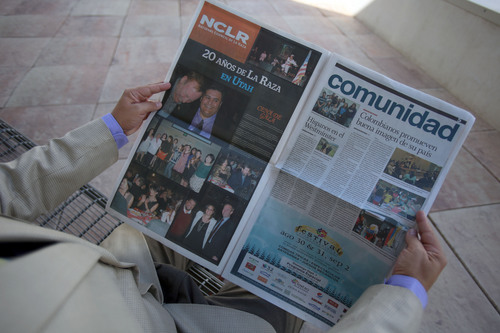This is an archived article that was published on sltrib.com in 2013, and information in the article may be outdated. It is provided only for personal research purposes and may not be reprinted.
While free Internet news and a poor economy killed scores of newspapers recently — including two Spanish papers in Salt Lake City in the past two years — veteran Utah journalist Reinaldo Escobar is launching a new one, The Spanish Times.
Escobar seeks to expand his audience and advertising beyond just Utah Latinos with a unique-to-Utah tactic: also targeting the state's non-Latino Spanish speakers — especially returned LDS missionaries — who may want to read it to improve their Spanish skills.
In fact, the few English words in the paper's first edition include the newspaper's name, and a slogan beneath it saying, "Improving your language skills with the news."
"We live in a bilingual society. The name [in English] reflects that," Escobar says. "It may also help attract former LDS missionaries, who I think would be interested in using it to help their language."
But he says the paper's main goal is to give the Latino community a mouthpiece, and something to bind it together with its native tongue.
"We need a voice," he says. "We have been invisible in recent years," saying Latinos have often been attacked in politics, saw a state Latino commission disbanded, saw some traditional cultural celebrations canceled and often have been relegated to low volume in immigration debates. "We need to be heard."
After working as a journalist in his native Colombia and for The Washington Times, Reinaldo came to Utah a few years ago to work for El Observador de Utah, a Spanish newspaper operated by the Deseret News. It folded earlier this year. Ahora Utah, which had been operated by The Salt Lake Tribune, closed last year.
He says the deaths of those two newspapers left a big hole for Utah Latinos.
"I had several people come up to me and say, 'What can we do? We need a newspaper,'" he says. Escobar considered starting a Latino magazine instead, "but people said, 'No, we need something more often than that.'"
He found enough financial backing to print 2,000 copies of a prototype, now available for free at many Latino businesses and some mainstream grocery chains. "We felt it was important to show the product to attract support.... But a lot of this is coming out of our own pockets for now," and he is working out of his home.
Escobar plans initially to publish twice a month, with 5,000 copies, with the next edition due out Sept. 29. He hopes it will become a weekly publication eventually.
For the time being, "I am the publisher, managing editor and a writer" with a few other freelance journalists helping, Escobar says. He is using MediaOne, owned by The Tribune and Deseret News, to print his newspaper.
The first 12-page edition has stories ranging from local community news to the immigration debate, local business, sports (focusing on Mexican soccer and baseball) and entertainment.
It includes a column by Escobar about why he started the paper, including goals "to preserve, spread and teach Spanish."
He also wrote in Spanish, "A newspaper is more than information on paper. Above all it is a community tie, a tribune of expression and especially a weapon to protect the rights of the community."
He added, "The Latino community of Utah is sufficiently important to merit a serious newspaper that is professionally edited. The Spanish Times is the answer to this need, and is also a reflection of who we are. It also is a means that we have lacked for the [Latino] community's businesses to advertise their products."
One of every six people in Salt Lake County is Latino — 17.5 percent, according to Census estimates, so he has a big potential audience. "And that doesn't count many of the LDS missionaries who learned Spanish serving in Latin America and Spain, and university students learning the language," Escobar says.
He knows he faces a big challenge during a time more newspapers are dying than starting. That's one reason he included a small drawing of Don Quixote in the masthead of the newspaper. "This is a little Quixotic, and like tilting at windmills," he said. "But Latinos deserve a good newspaper."





